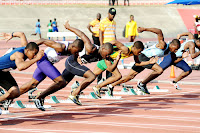Now that the 2012 London Olympics have come and gone, let's take a look back at the athletes who dominated, conquered and achieved golden success at the games.
Mo Farah doing the 'lightning bolt' and Usain Bolt returning the favour by doing the 'Mobot'
Here are my top 5 athletes of the games:
1. Usain Bolt
Coming into the games, there was some doubt over Bolt's form after he was beaten by his heir apparent Yohan Blake at the Jamaican national trials only a month earlier.
Bolt eventually went on to win 2 individual gold medals in the 100m and 200m sprints (Blake finished second in both races), and a team gold in the 4 x 100m relay - breaking an Olympic (200m) and world record (4 x 100m relay) in the process. There is no doubt the 2012 London Olympics cemented Usain Bolt's status as a living legend of the track.
“ I'm now a legend. I'm also the greatest athlete to live. ”
- Usain Bolt, after winning his seventh straight title in the 100 and 200m at the 2012 London Olympic Games
2. Mo Farah
The Somali born Brit achieved an amazing feat - winning the gold in both the men's 5000m and 10,000m. He covered all the breaks, resisted extravagant changes of pace, matched his talent against the machinations of the gifted Kenyans and Ethiopians and came home with the ferocious tenacity which has typified his career. Only 5 others have ever achieved the rare golden double and no Briton has ever come close until now.
Mo Farah's famous 'Mobot' celebratory move
3. Missy Franklin
The 17 year old all-American dubbed the 'missile' won 4 gold medals (2 individual and 2 relay) and a bronze from 7 events. Franklin also broke 2 world records in the process: in the 200m backstroke and 4 x 100 medley relay.
4.Ye Shiwen
Breaking out of the blocks, the 16 year old swimming sensation from China stunned the world by winning 2 gold medals in the 200m and 400m individual medleys, setting a new Olympic record and world record respectively, both previously set by Australia's Stephanie Rice at the 2008 Beijing Olympics.
Most shocking was the fact that Ye swam the final 50m in the 400m IM final in 28.93 seconds; 0.17 seconds faster than that of USA's Ryan Lochte, the men's gold medalist. Not surprising was the media's reaction with suggestions of illegal substance use, despite Lochte's overall time of 4.05.18 being 23.25 seconds faster than that of Ye's.
5. Serena WIlliams
At 30 years of age, when most of her contemporaries have retired, Serena Williams shows no sign of slowing down. Winning both the singles and doubles gold medals in women's tennis - and achieving the Golden Slam (all four Grand Slams and an Olympic gold), Williams' dominant display once again showed why she is considered one of the greatest to ever play the game of tennis.
It was definitely hard to pick only 5 athletes to feature in my list. So here are a few more who deserve honourable mentions.
Michael Phelps
Undoubtedly the greatest Olympian to ever compete. Phelps left London with 6 medals in tow: 4 gold and 2 silver, adding to his already impressive collection, bringing his medal tally to 18 gold, 2 silver and 2 bronze medals from 4 Olympic games.
Prior to the Olympics, Phelps announced these games would be his last.

Oscar Pistorius
Amazing does not begin to describe the South African athlete who participated in both the Olympic and Paralympic games. Known as the 'blade runner', Pistorius advanced through to the semi-final of the 400m at the Summer Olympics , finishing in last position with a time of 46.54 seconds. The South African 4 x 400m relay team qualified through to the final with Pistorius running the third leg, the team eventually finished eighth out of a field of nine competing in the final.
At the 2012 Summer Paralympics, taking place from August 29 - September 9, Pistorius is entered into the T44 100m, and the T42–T46 4 × 100m relay.

Female Muslim Athletes
Achieving success at the Olympic games does not always involve winning a medal. Having overcome political, social, religious and sporting obstacles, the chance to compete at the Olympics was a far greater victory than any gold medal.
Despite the lack of sporting success, these athletes have broken down major barriers, one being a Muslim, and two being a female. They have taken great strides for their countries and female equality just by their presence at the world's greatest sporting event.

Tahmina Kohistani (AFG), Fatima Sulaiman Dahman (KSA), Wojdan Shaherkani (KSA),
Shinoona Salah al-Habsi (OMA), Noor Hussain Al-Malki (QAT)
The 2012 London Olympics certainly brought out the best in athletes from all around the world with:

















